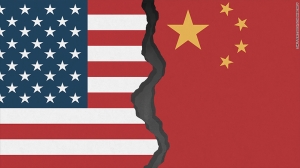


(Posted on 28/09/18)
With the U.S. government’s announcement last week on the imposition of an additional $200 billion in protective trade tariffs against Chinese imports, the American Association of Port Authorities (AAPA) – the unified and recognized voice of America’s seaports – continues to urge the Administration and federal policymakers to consider the negative impacts that tariffs have on port and other trade-related American jobs nationwide, including the effects of retaliatory responses. The new tariffs take effect on September 24, 2018 with the imposition of a 10 percent tariff which will increase to 25 percent by the end of the year.
“The impact of expanding Section 301 tariffs on cargo and equipment moving through American ports is already proving to be significant,” said AAPA President and CEO Kurt Nagle, who testified on Aug. 24 on behalf of the ports association during the U.S. Trade Representative’s Section 301 tariff hearings. “Including the additional $200 billion just imposed, the total Section 301 tariffs on Chinese commodities and China’s response in retaliation responses covers about 10 percent of all trade that moves through America’s ports by value, which is concerning. AAPA was pleased, however, to see that port cranes (tariff line 8426.19) were removed from the list, as we recommended at the recent hearings. Tariffs on these cranes, which cost upwards of $14 million each, would have harmed ports’ ability to make the investments necessary to handle the larger vessels now being used in ocean trade and hurt U.S. international competitiveness.”
“Because trade supports everyone, AAPA is encouraging federal policymakers to work swiftly to restore market certainties and forge paths to expand U.S. exports, rather than create new import restrictions,” he added.
At $4.6 trillion a year, the value of cargo activities at America’s seaports are significant drivers of the U.S. economy, supporting more than 23 million American jobs and generating over $320 billion in annual federal, state and local taxes. All but 1 percent of the nation’s overseas trade moves through its maritime facilities.
During the USTR’s Section 301 hearings in late August, AAPA urged that the multi-million-dollar container cranes that U.S. ports have on order and are considering purchasing from Chinese factories, for which there are no American-made alternatives, be exempt from tariffs. USTR did remove tariff line 8426.19 from the final list so these large cranes are not subject to the newly announced tariffs.
Founded in 1912 and recognized as the unified voice of seaports in the Americas, AAPA today represents 140 of the leading seaport authorities in the United States, Canada, Latin America and the Caribbean and more than 250 sustaining and associate members, firms and individuals with an interest in seaports.
The National Grain and Feed Association (NGFA) has applauded Senator Deb. Fischer’s (R-Neb.) reintroduction... Read more
Anglo American plc and Teck Resources Limited have received regulatory approval from the Government... Read more
The Rhodes Ridge Joint Venture has approved a $191 million (A$294 million) (Rio Tinto share $96 million... Read more
Trafigura Group Pte Ltd, a global leader in the commodities industry, has announced its financial results... Read more
Rio Tinto has successfully produced the first copper from the Johnson Camp mine in Arizona using its... Read more
The American Soybean Association’s World Initiative for Soy in Human Health programme and the... Read more
Karlka Nyiyaparli Aboriginal Corporation (KNAC) Registered Native Title Body Corporate and Rio Tinto... Read more
OCI Global, a leading global producer and distributor of nitrogen products has announced that it has... Read more
In December 2024, SSAB was granted a permit by the Land and Environment Court at Umeå District... Read more
The President of the Republic of Guinea has joined project partners WCS1, Baowu, Chinalco and Rio Tinto... Read more